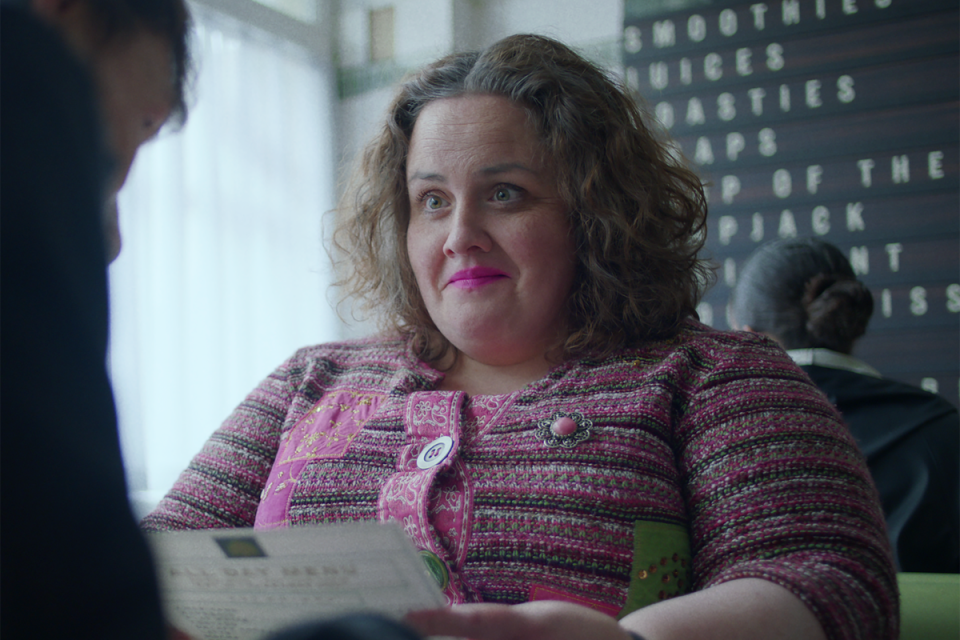Baby Reindeer’s ‘true’ story is getting more complicated by the day – and ‘Martha’ is now having her say

Perhaps Richard Gadd was naive? Maybe he didn’t realise Baby Reindeer, his limited series for Netflix inspired by his own stalking, would cause such a stir. That he could smudge the facts of his traumas just enough to protect the people involved. Perhaps he thought better of us. The success of Gadd’s series has been startling; strong reviews and word-of-mouth praise have made it an international hit, and it remains at number one on the streamer’s UK chart more than four weeks after its release. The last three of those weeks, though, have seen the show careen into its inevitable second act. The armchair detectives have arrived.
The seven-episode series concluded with a nine-month prison sentence and a restraining order for Gadd’s stalker, his aspiring stand-up Donny looking on as Martha (Jessica Gunning), the woman who’d terrorised him and his loved ones for four years, was led away in handcuffs, her face wan with guilt. Whether this actually happened has been kept deliberately vague.
Gadd has always declined to speak of the real Martha’s present-day whereabouts, and how her harassment campaign came to an end. While doing press for Baby Reindeer – as well as his earlier one-man show at the Edinburgh Fringe about his experiences – he has only ever said that the stalking ended.
How is unclear. “I didn’t want to throw someone who was that level of mentally unwell in prison,” Gadd told The Times earlier this month. For some, though, this hasn’t been an acceptable climax. Despite Gadd insisting that the Martha of Baby Reindeer is “different for legal reasons” from his real stalker, social media accounts purportedly belonging to the woman who inspired the character were found and scoured for information.
Two tabloid newspapers claimed to identify the woman – a woman in her fifties who gained a law degree from Dundee University and worked briefly as a trainee solicitor. A lawyer who had employed “Martha” then told her story about being pursued by her after she had fired her after a two-week tryout because of her attitude.
Few in the vicinity of this on-screen drama have been untouched by the ensuing off-screen repercussions. Last week, representatives of Gadd sent out a legal notice to the media after concerns about the presence of members of the press in the vicinity of his home, and approaches made at his property and to his parents.

The woman identified as Martha has threatened to take action against Netflix and her social media posts have been manic and concerning. She is also now due to appear on Piers Morgan’s talk show this week, to the dismay of many observers.
Separately, attempts have been made to identify the man who raped Gadd, in a sexual assault that is recreated with horrifying specificity in Baby Reindeer’s fourth episode – and that he explored in 2016 in his award-winning one-man show Monkey See, Monkey Do.
An actor and director named Sean Foley has indicated that he has contacted police over “defamatory, abusive and threatening posts” following speculation made about him in connection to the show.
On his Instagram, Gadd has urged viewers to stop. “People I love, have worked with, and admire (including Sean Foley) are unfairly caught up in speculation. Please don’t speculate on who any of the real-life people could be. That’s not the point of our show. Lots of love, Richard x X.”
Ignoring this appeal – or at least completely misunderstanding it – was Richard Osman, who only fanned the flames of speculation on his podcast, The Rest Is Entertainment, last week. “[Gadd] has been very open to people in the industry about who [his rapist] was, so people in the industry know who that person was,” he claimed. So is Gadd’s rapist famous, then? Is he still working? Who could it be? It was yet another tantalising breadcrumb of information for budding Sherlocks to latch onto.
A misguided logic when it comes to Baby Reindeer is that it’s a good thing to expose the people involved in Gadd’s past. That a digital calling-out is a form of karmic retribution
But why, as viewers, do we feel the need to do this? It feels like a go-to response to lots of pop culture right now. Trauma is content. Storytelling is a mystery to solve. A backstory is a clue. It has been seen in responses to Quiet on Set, the recent US documentary series about sexual abuse and misconduct at Nickelodeon and other children’s TV channels.
It’s also been seen in responses to sexual misconduct allegations against high-profile stars such as Sean “Diddy” Combs, and the reactions to Kate Middleton’s health both before and after her cancer announcement.
We see social media accounts pledging to unearth more wince-inducing claims, embroider real experiences of trauma until they become baroque and fantastical, and cast shadows of suspicion around people who choose – for whatever reason – not to comment. More victims, more allegations, more horror. Sequel. Sequel. Sequel.
Depressingly, much of this gets couched in the language of empathy. A misguided logic when it comes to Baby Reindeer is that it’s a good thing to expose the people involved in Gadd’s past. That a digital calling-out is a form of karmic retribution. But beyond the dangers of getting it wrong and accusing entirely random individuals of being rapists and stalkers, it’s also deeply cruel to Gadd himself. His series serves as an open and often deeply mortifying excavation of his worst experiences.
Attempting to go after those involved sends a message that this wasn’t good enough – that, actually, he’s tackled his trauma the wrong way. We need names! Dates! Loud, public, screaming accountability!

All of this said, it’s a bit too simplistic to lay sole blame on the internet here. While perhaps no one involved in Baby Reindeer could have seen its success coming, it doesn’t quite justify how wildly unprepared everyone seems to have been when it comes to the real Martha.
Gadd’s approach in interviews has been to slightly side-step questions about her – we don’t know who she was, where she is now, or how their relationship came to an end. He has said that the facts of his case have been slightly changed for TV and that he only cast Gunning as she captured “the essence” of the real woman.
But these are also incredibly ambiguous statements, to a degree that it’s not especially surprising that people have tried to dig further into the story. The disconnect between Gadd’s intentions and the public’s response to the show is echoed in Baby Reindeer itself. He has repeatedly said that he wrote Martha as a sympathetic character, at odds with typical “femme fatale” depictions of female stalkers in film and television.
“I felt like [the real Martha] was a vulnerable person who genuinely couldn’t stop,” he told Variety. “It is a mental illness and I wanted to portray that. I did see someone who I felt sorry for.”
But Martha, by the very nature of Donny being the show’s central point of view, isn’t particularly well-defined as a character. We only ever know as much about her as Donny does, and claims that the show is a two-hander between a pair of broken souls feels untruthful.

That we have empathy for Martha is entirely down to Gunning’s remarkable performance, which pivots masterfully between sorrow, desperation, and violent antagonism.
There isn’t, on paper at least, much else there for us to latch onto. Donny gets an inner monologue, and the opportunity every episode to articulate his own thoughtlessness and cruelty – in voiceover, he lambasts himself for the shame he feels for dating a trans woman, and acknowledges his slight complicity in Martha’s obsessions, indulging the fact that he’s become the centre of her universe.
Baby Reindeer is set up for us to see all of Donny’s messy parts, to tut disapprovingly at his failings. Martha isn’t afforded quite the same luxury. Yes, she is a woman adrift in mental illness. But first and foremost she is a demonic aggressor, who assaults his girlfriend, tells his parents that he’s died, and invades the home of his ex’s mother. Whatever Gadd says, the show isn’t as morally ambiguous as he seems to think it is.
This tension – of who is to blame here, of Gadd as both a victim of a horrible act of stalking and a maker of his own mythology – does ultimately make Baby Reindeer one of the most fascinating shows of the year. But it requires responsibility on our part as viewers, too, and an understanding that it’s not a series that can be squeezed into a simple box. Gadd hasn’t created a true crime documentary, or a puzzle for armchair detectives to solve. Reducing it as such both diminishes its power and harms everyone involved.

 Yahoo News
Yahoo News 
